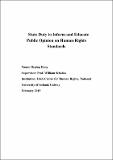| dc.description.abstract | The present study seeks to challenge the State's tendency to simply blame public opinion when there are difficulties in protecting and promoting human rights. This study discovers that on racial and gender equality, international law expects States to play a positive role in educating public opinion. International law also expects States to mobilise public opinion with regard to the protection of the rights of Children and persons with disabilities, the prohibition of torture, slavery, violence, abuse and exploitation, and the protection of cultural rights and others. To the extent that education bears an aim of strengthening respect for human rights and fundamental freedoms, this study discusses whether States have a general duty to inform and lead public opinion with regard to core human rights standards. The discussion is advanced by an analysis of the major treaties and relevant declarations, their travaux préparatoires, the material generated by those treaties such as periodic reports, concluding observations and general recommendations, other historical legal documents and the newly established mechanism the Universal Periodic Review (UPR). The study also explores the boundaries for States' positive actions, by examining the case of capital punishment and public opinion. Noting that the abolition of the death penalty is currently moving toward a requirement of core human rights, considerable evidence shows that international law urges States to mobilise public opinion on this very issue. This study holds the view that States' educational duties on fundamental human rights will be inevitably applied to the death penalty issue. Arguments of the study would diminish the State argument that the death penalty has to be retained because of public opinion. On a larger scale, this study brings up legal support for States' positive actions to protect and promote core human rights standards. | en_US |


